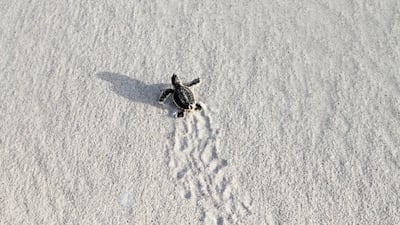All unnecessary illumination along Saadiyat Island beaches will be switched off to help boost the survival rate of baby turtles hatching in the sands and looking to the Moon to find the sea.
ABU DHABI // They are the dazzling lights that spell doom for the turtles of Saadiyat Island, drawing them towards man-made threats and away from the water they need to survive.
Now hotels are to shut off all unnecessary illumination and use red bulbs for the next six months as the hawksbill turtle hatching season gets under way.
Visitors to Saadiyat’s beaches are being encouraged to take extra care to protect the hatchlings from now until August to help the endangered species survive.
“We really need to make sure we are prepared for whenever the turtles might come,” said Arabella Willing, head of conservation at the Park Hyatt Saadiyat.
“About two in every 100 turtles hatchlings survive to maturity. With human interference that number is closer to two in every 1,000.”
A well-established nesting site, Saadiyat’s rapid modernisation has led to problems for the hawksbill, which returns to nest on the beach where they hatched.
Turtles swim ashore and lay their eggs, burying dozens in the sand, before returning to the seas. After about two months, the tiny turtles shed their shells, break for the surface and head for the sea.
By natural instinct, they head for the moonlight over the sea – historically, the brightest object in the night sky – but lights in built-up areas confuse them in what in many cases will be a fatal error.
To avoid this, hotel staff will switch off all unnecessary lights. The red bulbs emit light on the lower end of the electromagnetic spectrum, which is not as intrusive to turtle behaviour.
Staff at the hotels also scour the beach every morning to look for signs of nests during the six-month period.
If any are found, the nest and the surrounding area are sectioned off so as to ensure safety.
A team of marine biologists will go as far as redeploying the nest in another area of the beach if they consider them too close to where waves break in high tide, which reduces hatchling survivability.
Typically, up to 12 nests are made on Saadiyat, but with each nest capable of holding 100 hatchlings, the stakes are very high.
As the turtles prefer to lay eggs on the beach that they hatched many years before, there is a great need to ensure it is kept as a haven.
“Providing the ideal grounds for them is what we really are trying to achieve,” Ms Willing said.
“We don’t have enough data to track the growth yet, but we want to provide the absolute best environment we can.”
Dr Himansu Das, head of marine threatened species and habitats at the Environment Agency Abu Dhabi, said experts were hopeful of a successful hatching season.
“Keeping the nesting beaches clean and free from movement of man and machine will ensure successful nesting of turtles,” he said. “Diffused and direct lights on the beaches are also harmful to turtles and the hatchlings.
“We must keep turtle nesting beaches including Saadiyat as natural as possible for sea turtles to nest.
“Besides, we should have a long-term monitoring programme to see the success of conservation action.”
Visitors who see turtles are asked to report them to hotel staff, or the environment agency, which can be reached by phone on the number 800555.
nalwasmi@thenational.ae

